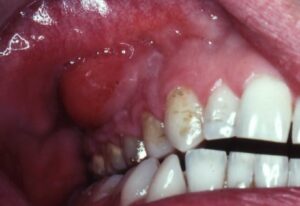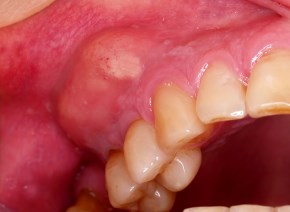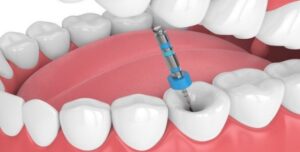Tooth abscess nightmare – A dental abscess can be termed as a collection of pus that forms in response to a bacterial infection of the tooth or gums. Depending upon its severity, the pus can form and pool inside a tooth, gums, or even bone.
One of the most common and painful dental problems is a tooth abscess. To help you understand this condition better, we’ll be discussing the five stages of tooth abscess, its symptoms, and the available treatment options. So, let’s dive right in and learn how to identify and deal with a tooth abscess effectively!
Stage 1: Bacterial Infection
A tooth abscess usually starts with bacteria entering the tooth’s inner layers, i.e. enamel and dentin. The bacteria begin to multiply and produce acids that break down the tooth enamel, leading to the formation of cavities. This can happen for various reasons, such as tooth decay, gum disease, or a cracked tooth.

Symptoms
At this stage, you may not experience any symptoms or just mild tooth sensitivity to hot or cold substances.
Stage 2: Pulp Involvement
As the infection progresses, the bacteria invade the tooth’s pulp, which contains nerves and blood vessels. This can cause inflammation and pressure, leading to more severe pain and sensitivity.
Symptoms
You may start to experience moderate to severe pain, especially when eating or drinking hot, cold, or sweet substances. The pain may persist, and you might notice some discolouration of the affected tooth.
Stage 3: Root Canal Infection
If the infection is left untreated, it can spread to the root canal, causing a periapical abscess. This type of abscess forms at the tip of the tooth’s root and can damage the bone around the tooth.
Symptoms
The pain may worsen and become more constant. You may also develop fever, swollen lymph nodes, and facial swelling. Biting or applying pressure to the tooth can be extremely painful.
Stage 4: Periodontal Abscess
The infection can sometimes spread to the gums and cause a periodontal abscess. This abscess type affects the tooth’s supporting structures, including the periodontal ligament and the alveolar bone.

Symptoms
You may notice painful, swollen, red gum around the affected tooth. There may be pus discharge from the gum, and you might experience a foul taste. The tooth may become loose, and you may have difficulty chewing.
Stage 5: Systemic Infection
In rare cases, the infection can spread beyond the mouth and affect other parts of the body in the head and neck region. This is a potentially life-threatening situation and requires immediate medical attention.
Symptoms
You may develop a high fever, chills, rapid heart rate, and difficulty breathing. The infection can also cause facial cellulitis or, in severe cases, sepsis.
Treatment Options
Antibiotics
Your dentist may prescribe antibiotics to help control the infection. However, antibiotics alone are not enough to treat a tooth abscess, and further dental treatment is necessary.
Root Canal Treatment
This procedure involves removing the infected pulp, cleaning the root canal, and sealing it with a biocompatible material. Afterwards, the tooth is restored with a crown or filling to protect it from further damage.

Tooth Extraction
In cases where the tooth cannot be saved, your dentist may recommend extracting the tooth to prevent the infection from spreading.
Periodontal Treatment
If the abscess is affecting the gums, your dentist may perform a deep cleaning to remove plaque and tartar and may surgically drain the abscess.
Pain Relief
Over-the-counter pain relievers like ibuprofen can help alleviate pain and inflammation. However, it is essential to consult your dentist for the appropriate treatment.
Key Takeaway
To prevent a tooth abscess, it’s crucial to maintain good oral hygiene and visit your dentist regularly for check-ups and cleanings. Remember to brush your teeth twice a day, floss daily, and use an antimicrobial mouthwash to keep your mouth clean and healthy.
If you suspect you have a tooth abscess, don’t wait to seek professional help. If you’re experiencing any of the symptoms mentioned above, make an appointment with your dentist immediately. Early diagnosis and treatment can save your tooth and prevent complications.
Looking for a Consult?
If you’re concerned about an infected tooth that is oozing pus. Then look no further than Vue Dental. We’ll treat your teeth to cure them of any infection and restore their functionality!
Our state-of-the-art dental office is equipped with the latest equipment and a highly qualified team of dental practitioners who can address all your dental issues.
Get a consult with Dr Keshavi Patel today by calling us at 512-888-9340 or book an appointment online via our website. We offer all sorts of dental services, so feel free to contact us with any queries about your oral health!
